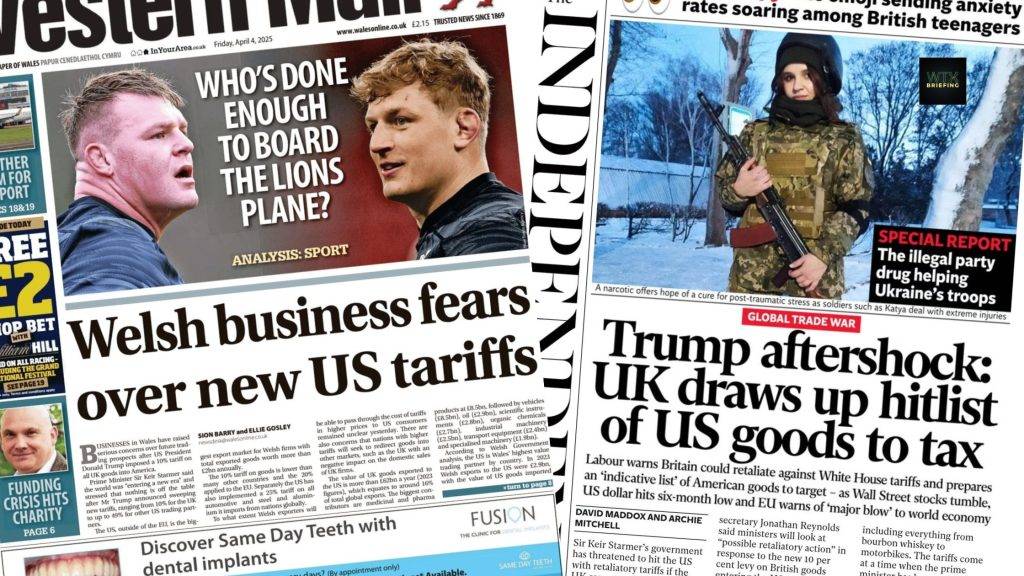Global stock markets chaos – The story that is dominating every news site – in print and online – today is, of course, the ongoing chaos facing the global stock markets following Donald Trump’s latest US tariffs.
“The markets are going to boom, the stock is going to boom and the country is going to boom”
Donald Trump
- Global stock markets experienced significant declines following President Trump‘s announcement of sweeping tariffs, including a 10% tax on imports from the UK.
- Both US and European markets reported their worst one-day losses since the COVID-19 pandemic, raising concerns about a potential recession and international retaliation.
- Economists warned of a “spiral of doom,” suggesting that retaliatory measures could lead to further economic destabilisation.





Tariff turmoil wipes trillions of dollars off global stock markets
Explainer – The headline contains bias through its emotive language and implied causality. Words like “turmoil” and “wipes” dramatise the impact, evoking panic and reinforcing a negative narrative. It also attributes massive financial losses solely to tariffs, oversimplifying complex market dynamics and potentially shaping the reader’s perception before presenting any factual context.
- The Guardian reports that the financial markets took after Trump announced a raft of worldwide tariffs on Wednesday night – for Wall Street, that led to its biggest one-day losses since June 2020, during the pandemic.
MELTDOWN: Global stock markets plunge £2 TRILLION as Trump’s tariffs cause calamity for investments and pensions
Explainer – The headline displays clear bias through sensationalist language and a strong political framing. Words like “meltdown,” “plunge,” and “calamity” heighten alarm and fear, while directly blaming “Trump’s tariffs” assigns personal responsibility in a loaded manner. This framing may influence readers to view the events through a dramatic and politically charged lens rather than with nuance.
- The Daily Mail reports that the £2 trillion plunge that markets experienced on Thursday caused “calamity for investments and pensions.” Panic spread among investors in London, Europe, Asia and Wall Street after the US President slapped huge tariffs on America’s trading partners, stoking widespread fears of a recession, the paper adds.
Britain threatens America with new ‘Tesla tax’ as stock markets tumble
Explainer – The headline reveals bias through its choice of provocative language and implied linkage. The word “threatens” suggests hostility, framing Britain’s potential policy move as aggressive rather than strategic or retaliatory. By coupling this with the phrase “as stock markets tumble,” the headline subtly connects the two events, potentially misleading readers into assuming causation where there may be none.
- The i says cheddar cheese might be spared the “meltdown” that other UK producers are fearful will happen when they are slapped with new American tariffs of 10%. The paper says it boils down to one harsh truth, according to Stephen Jones, co-founder of Somerdale, who tells the paper: “There are some nice American cheeses, but most of it’s pretty bland and horrible.” The paper looks at the American products that could be slapped with retaliatory tariffs.
World reels from Trump trade shock
Explainer – The headline demonstrates bias through emotive phrasing and a personalised attribution of blame. The verb “reels” conveys a sense of widespread disarray and vulnerability, while “Trump trade shock” centres the blame squarely on one individual, suggesting his actions are both sudden and damaging. This framing amplifies drama and may lead readers to view the situation as more chaotic and one-sided than it truly is.
- The FT looks at the products and sectors that will likely face higher prices and reports that despite Trump’s promises, the country’s consumers will be the “biggest victims” and will be “paying more for everything from trainers to beer.” The business paper says car buyers are in line for a $30bn hit whilst clothes, wine, spirits, luxury goods and flight tickets are all set to see price increases.
Britain must copy Singapore, says Hunt
Explainer – The headline carries bias through its definitive and imperative tone. The use of “must” implies urgency and inevitability, potentially overstating the authority or correctness of Hunt’s viewpoint. It presents his opinion as a directive rather than a proposal, which could influence readers to accept it as a necessary course of action without critical evaluation.
- The Daily Telegraph leads with Jeremy Hunt’s call that Britain must copy Singapore and resist responding to the US with retaliatory tariffs in what the paper says is Hunt’s “first major intervention since leaving office. The former chancellor asks the PM to model the modern British trading system of its former colonial trading post’s current system.
Trillions lost as Trump tariffs hit global stocks
Explainer – The headline shows bias through its dramatic framing and direct attribution of blame. The phrase “trillions lost” is striking and alarmist, while “Trump tariffs hit global stocks” simplifies complex market movements by placing sole responsibility on one policy decision. This kind of framing can shape reader perception by implying a clear cause-and-effect relationship without acknowledging broader economic factors.
- The Times says that as trillions are wiped off the global stock markets, business leaders have warned the prime minister not to retaliate. The paper says that Trump and the US would be stronger after a global trade war.
As $2.2 trillion wiped off firms: Bog off, Trump!
Explainer – The headline exhibits bias through its inflammatory language and direct political targeting. The phrase “Bog off” is a highly informal, dismissive expression, which weakens the tone of objectivity and conveys hostility towards Trump. Combined with the dramatic “wiped off” and the substantial loss of $2.2 trillion, it frames the situation in a way that implies blame and resentment, shaping the reader’s view with emotional and partisan overtones.
- “Bog off, Trump,’ says The Sun, which reports the UK is threatening around 8K products with tariffs as “Trump’s trade war plunges markets into meltdown.”


